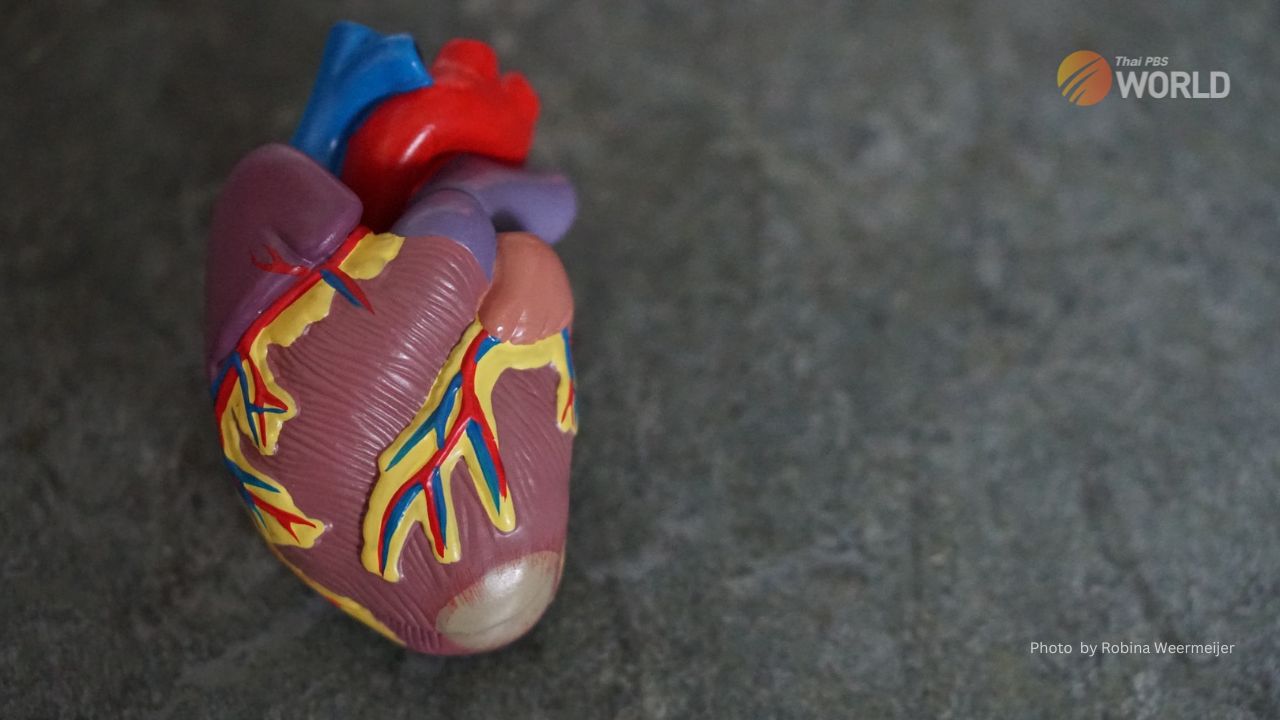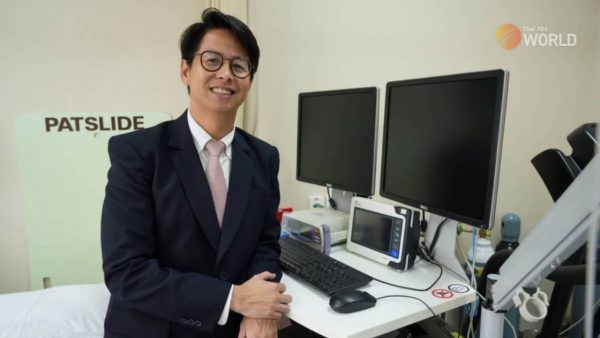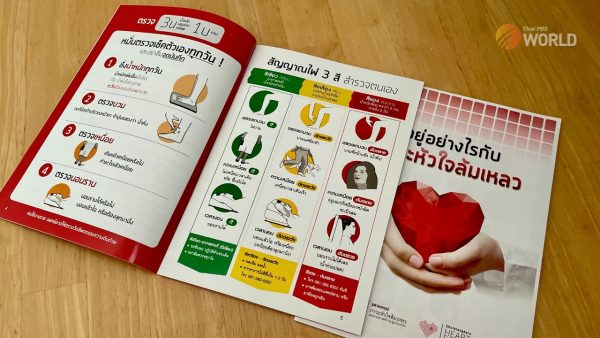Heart failure: cardiologists put out a call to action

If you experience fatigue or you notice that one or both of your legs is swollen, you will probably brush it off, blaming the tiredness on too busy days and the swelling on sitting in the same position for too long. But writing off these seemingly innocuous symptoms is a mistake as they might well be telling you that your heart is failing.
Lack of knowledge aside, it’s perhaps even more worrying is that overlooking these symptoms is one of the reasons why 16.1% of heart failure cases are misdiagnosed in hospitals*.
Patients who are misdiagnosed may face adverse impacts including receiving inappropriate care that could lead to fatal consequences. In less severe cases, misdiagnosis can still impose a burden on healthcare costs.
“Heart failure can be cured but receiving an early diagnosis is crucial for better treatment outcomes,” said Aekarach Ariyachaipanich, MD FACC, a Heart Failure and Transplant Cardiologist with the King Chulalongkorn Memorial Hospital.
Dr Aekarach pointed out that heart failure is a significant and growing public health concern in Southeast Asia, and Thailand is no exception. “In Southeast Asia, approximately 1% of the population suffers from heart failure and 10% of these cases are those aged 70 years old and above,” he said during a press interview at The Asian Pacific Society of Cardiology (APSC 2023) held recently in Singapore.
The lack of awareness is a problem shared by other Asian counterparts including Singapore, according to Assoc Prof David Lim, head and senior heart consultant of the island state’s National Heart Centre, explaining that many people see shortness of breath as a symptom of old age and so do their general physicians. “Surprisingly, the lack of awareness is among the primary care physicians too and not only patients and their caregivers.”
In a separate interview, Dr Aekarach stressed that timely diagnosis was important because patients stand a chance of successful treatment. “Approximately 30% of patients can be cured completely with early detection while another 30% have the heart failure under control,” the Thai heart specialist said.

The lack of awareness about heart failure requires immediate attention from both patients and physicians but almost always leads to late referral to specialists. “Cardiac biomarkers such as NT-proBNP are valuable tools for the diagnosis and prognosis of heart failure recommended by major cardiology guidelines,” said the Singapore expert Dr Lim.
The arrival of the so-called peptide (NT-proBNP) test could be a game-changer, supporting early diagnosis. This is especially crucial in the case of Thailand, where access to imaging tests like echocardiogram (ECG) is limited primarily to larger and leading hospitals. In addition to its accessibility, the peptide test also offers a cost-effective alternative.
Early detection could help save lives and improve patient care. Heart failure is the leading cause of cardiovascular hospitalization worldwide, with a high mortality rate of more than 50%. In 2019, cardiovascular disease was the leading cause of death in Asia, accounting for 10.8 million deaths and 58% of the total deaths globally.
“A simple blood test costs a lot less and can be done by a nurse. I’ve heard from our counterparts in Hong Kong that a patient has to wait for almost 3 or 4 years to get an ECG,” Dr Lim added.
The heart failure situation is expected to worsen in this region due to shifts in population demographics and lifestyle, and as Thailand becomes an aging society. “We don’t have data on heart failure numbers but we do know that we have 20 hospital admissions per 100,000 in Thailand and it will worsen as our population continues to grey,” said Dr. Aekarach, who is also a director of the Heart Association.
To prevent a possible delay in diagnosis, the Thai heart failure specialist has educated his patients to observe potential symptoms. “We advise them that if they or someone in their circle experiences fatigue, swelling in the legs or feet or finds it difficult to lie down, they ought to see a physician immediately to check for signs of heart failure.”
Thailand is facing its own set of challenges in tackling heart failure so enhancing awareness and education and improving access to healthcare and therapies are vital.
“My modest short-term goal is to prescribe all four essential medicines to heart failure patients, and prevent any of them from being readmitted to hospital within 30 days of their discharge,” said Dr Aekarach.

Thailand’s goal is in line with the new approach to patient care shared by Dr Lim. Up to 15% of heart failure patients are readmitted within 30 days and stay in the hospital from five to 12 days on average. “We don’t want them to keep coming back like a frequent flyer programme. Our new approach is to treat them like a cancer patient. Once a cancer patient is discharged, the doctor has to follow up closely. We want to apply the same treatments for heart failure patients so they will never return to the hospital.”
Dr Lim added that the association’s guidelines call for action on awareness, diagnosis and delivery of care to heart failure patients to improve the overall situation and the quality of lives of the patients.
“The bed situation we witnessed during the pandemic is quite bad in our region. It is important that we follow up on our patients as we would for cancer patients after chemotherapy to prevent them to having to be readmitted. The cost of heart failure admission in Asia Pacific is very high, estimated at US$48 billion,” said Dr. Lim.
Patients also have to adjust their lifestyle to achieve a successful outcome including eating a salt-free diet, stopping smoking and drinking, and exercising regularly. Dr Aekarach even distributes a notebook for each patient to write their observations and keep a note of their weight.
“A self-check to prevent heart failure involves monitoring specific symptoms and keeping a record. Regularly weigh yourself (sudden weight gain may indicate water retention), check for swelling in the legs (which can also suggest fluid buildup), be mindful of fatigue while walking or moving, and assess your ability to lie down comfortably. If you experience any of these symptoms, it is crucial to contact your GP immediately,” said the Thai heart specialist.
“While there are various factors that can contribute to heart failure, cardiological diseases are among the primary ones. Medical professionals recommend closely monitoring individuals in high-risk groups. These groups include the elderly, people with diabetes, hypertension, and kidney disease.”

Asia Pacific’s Heart Failure at a Glance:
1% of the population in the region experiences heart failure.
10% of people aged over 70 suffer from heart failure.
15% of heart failure patients are readmitted to the hospital within 30 days.
16.1% of heart failure cases are misdiagnosed in hospitals.
23% of deaths in 1990 are attributed to cardiovascular disease.
35% of deaths in 2019 are attributed to cardiovascular disease.
58% or 10.8 million global cardiovascular deaths occur in the Asia Pacific region.
Average hospital stay ranges from 3 to 12.5 days.
6 million heart failure admission cases in one year.
Thai patients have an average hospital stay of 14.2 days.
32 million people in the region are affected by heart failure.
Total cost of heart failure-related hospitalization per year is 48 million US$.
Sources: *Roche, APSC 2023
By Veena Thoopkrajae






